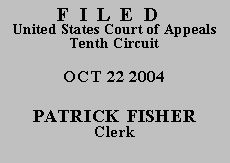

| JOHN CHARLES GAUTHIER, | No. 04-5082
(D.C. No. 04-CV-387-EA(J)) |
Petitioner, proceeding pro se and in forma pauperis, now renews his application for COA before this court, claiming (1) malicious prosecution, (2) bias on the part of the sentencing judge, (3) violation of his right to a speedy trial, (4) error because he was "charged under the wrong statute," (5) improper communications between judges and prosecutors, (6) violation of the Thirteenth Amendment, (7) improper sentencing enhancements and fines, (8) violation of the Eight Amendment for the reasons set forth in a separate 42 U.S.C. § 1983 civil rights complaint, (9) ineffective assistance of counsel, (10) improper denial of credit for time served, and (11) a violation of equal protection in sentencing. For the reasons set forth below, we DENY COA and DISMISS Petitioner's appeal.
Under AEDPA, a habeas petitioner must obtain a COA before proceeding on appeal. 28 U.S.C. § 2253(c)(1). A COA may issue "only if the applicant has made a substantial showing of the denial of a constitutional right." Id. § 2253(c)(2). Before a state prisoner may even assert a claim for habeas relief in federal court, he must exhaust his state-court remedies. Id. § 2254(b). A district court's decision to deny COA on procedural grounds will be reversed only if Petitioner establishes both that "jurists of reasons would find it debatable whether the petition states a valid claim of a denial of a constitutional right and that jurists of reasons would find it debatable whether the district court was correct in its procedural ruling." Slack v. McDaniel, 529 U.S. 473, 484 (2000).
When the district court denied COA in this case, Petitioner had not sought to withdraw his guilty plea, appeal his conviction, or pursue any state post-conviction proceedings. Therefore, the district court properly found that Petitioner had not exhausted his state court remedies and had not made an adequate showing that pursuing available state court remedies would be futile.
Petitioner has now submitted a subsequent state court order evidencing the state's denial of his attempt to file a late appeal. This raises a new problem. When we find that the court to which Petitioner would be required to exhaust his state court remedies would now find those claims procedurally barred, we consider the claims exhausted and procedurally defaulted. Hale v. Gibson, 227 F.3d 1298, 1327-28 (10th Cir. 2000). A federal court on habeas review will not consider claims that have been defaulted in state court on an independent and adequate state procedural grounds, unless Petitioner can demonstrate cause and prejudice or a fundamental miscarriage of justice. Coleman v. Thompson, 501 U.S. 722, 750 (1991). This court has held that Oklahoma's procedural bar to most claims not raised on timely direct appeal is independent and adequate. Hale, 227 F.3d at 1328.
In this case, Petitioner has not made a "colorable showing of factual innocence" for the purpose of establishing that our failure to consider his claim would lead to a fundamental miscarriage of justice. See Demarest v. Price, 130 F.3d 922, 941 (10th Cir. 1997). Therefore, we examine whether cause and prejudice exist to allow federal habeas review despite the state's procedural bar. Cause is established by proof that some objective factor, external to the petitioner and not fairly attributable to him, impeded his efforts to comply with the state procedural rule. See Coleman, 501 U.S. at 753. To establish prejudice, the petitioner must establish that he will suffer "actual prejudice as a result of the alleged violation of federal law." Id. at 750.
In this case, Petitioner has made no showing of cause. He cites no external, objective reason for his inability to pursue state remedies to withdraw his guilty plea, appeal his conviction or sentence, or pursue state collateral proceedings. Although Petitioner does argue that he was afraid for his life at the prison where he was held pending his plea, that because of this fear he was "coerced" to plead guilty, and that the prosecutors and judges were biased against him, he does not explain how this impeded any of his efforts to comply with state appellate procedures. Furthermore, his allegation of ineffective assistance of counsel relates primarily to his safety concerns in prison and his private attorney's failure to talk him out of his plea. He also asserts that his attorney was on the prosecution's side. However, this does not establish cause for his failure to pursue available state court remedies after his plea.
We do not think this procedural decision is debatable among reasonable jurists. Therefore, we find that Petitioner's claims are procedurally barred and, on that grounds, DENY COA on all eleven habeas claims and DISMISS this appeal.(*)
ENTERED FOR THE COURT
David M. Ebel
Circuit Judge
*.Because we have dismissed this appeal on procedural grounds, we DENY Petitioner's Motion to Supplement the Brief and Motion to Supplement the Record on Appeal as MOOT. These submissions relate to the merits, not the procedural posture, of Petitioner's claims. However, as indicated in this order, we do consider the Oklahoma district court's decision to deny Petitioner an out-of-time appeal, a copy of which was submitted with Petitioner's opening brief to this court.